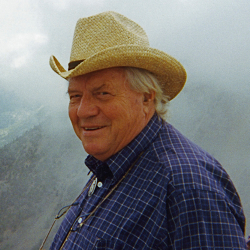
Swiss petroleum geologist responsible for prospecting in Canada, Europe and Africa, and who became Foreign Secretary of the Society.
Walter Ziegler was born in Winterthur, Switzerland. His father was a doctor who was interested in nature and encouraged his four children to follow the same subject. They took holidays in the Jura mountains, where he made his first observation of anticlines and started collecting fossils. Another influence was a family friend who was an oil geologist and recounted his exciting experiences from Burma to South America.
ETH Zurich
He went to boarding schools when war broke out, and there one of his teachers drew his attention to the natural world of mountains, rocks, plants and animals. In 1947, he took a course in natural science at ETH in Zurich but also had to undertake mandatory military service. He won a doctorate in 1955, before taking his first job with the Institut Français de Pétrole in Paris where he was engaged in mapping the Sahara of Algeria, largely with the help of air photographs, which he found a bit boring. He then accepted an offer to work for Exxon in Canada, where he joined a field party mapping a remote area in the Rocky Mountains, having many colourful experiences. He spent four more years there, before the company decided it was better to import cheap oil from Venezuela than map the uncertain prospects of the Rocky Mountain foothills. This gave him his first appreciation of the economic factors influencing the oil industry.
In 1964, he was transferred to the company's office in Geneva to use his Canadian experience to try to explore Triassic prospects in Austria and the southern Alps. That was followed by time in another office in Spain to make regional studies of the North Sea, which was opening, as well as Germany, Belgium and parts of Africa. He was then recalled to Calgary and undertook more sophisticated work, involving geochemistry to determine where oil and gas were generated and seismic stratigraphy to evaluate the prospects, but it became evident that most of the large fields in western Canada had already been found.
Foreign Secretary
He was accordingly transferred back to the office in Spain from which he made many trips to Africa, evaluating the prospects of different onshore basins, which had limited potential. An unexpected discovery in the northern North Sea then prompted a new study of offshore opportunities around the world. He was appointed Chief Geologist of an office in England to evaluate them, concentrating on North Sea ventures including those off Belgium and Norway. He enjoyed life in Britain and started his second marriage in 1974, being duly blessed with a son. He was also elected to be Foreign Secretary of the Geological Society.
In 1983, the company closed its office and offered him a transfer to Houston as frontier manager, but he decided to resign, as the company seemed to be losing interest in world exploration. He joined the Belgian company Petrofina. It was basically a marketing company, seeking to expand its exploration and production having taken positions in the Ekofisk Field (Norway) and in Angola. He helped build expertise in basin modelling, being duly offered a position in the head office in Brussels. He concentrated on geology, but found that the company was primarily concerned with business considerations, negotiating deals and finding partners.
Lausanne
He retired in 1992 and returned to Switzerland with his wife to live in a beautiful house near Lausanne, located in vineyards overlooking Lake Geneva with a backdrop of the Alpine mountains that had so captivated his imagination in childhood. Then with advancing years finding it rather too much to manage, they moved in 2007 to a top floor apartment in Lausanne, also with spectacular views. He had become aware of the world resource limits and the nature of depletion, which led him to play an active part in the Swiss branch of the Association for the Study of Peak Oil (‘ASPO’).
He had a very good and friendly personality, being much admired by friends and those who worked with him. He also had an interest in classic cars. He stayed in touch with his friends with the help of the internet to his final days, having led a very successful and colourful life.
By Colin Campbell
(Author's note: Ziegler wrote an autobiographic chapter in a book entitled
Peak Oil Personalities : ISBN 978-1-908378-06-4)